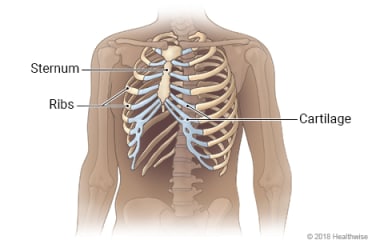
Overview
You can get a bruised rib if you fall or get hit, such as in an accident or while playing sports. The medical term for a bruise is "contusion." Small blood vessels get torn and leak blood under the skin.
Most people think of a bruise as a black-and-blue area. But bones and muscles can also get bruised. An injury may damage the rib but not cause a bruise that you can see.
Sometimes it can be hard to tell if a rib is bruised or broken. The symptoms may be the same. And a broken bone can't always be seen on an X-ray. But the treatment for a bruised rib is often the same as treatment for a broken one.
An injury to the ribs can cause pain. The pain may be worse when you breathe deeply, cough, or sneeze.
In most cases, a bruised rib will heal on its own. You can take pain medicine while the rib mends. Pain relief allows you to take deep breaths.
Follow-up care is a key part of your treatment and safety. Be sure to make and go to all appointments, and call your doctor if you are having problems. It's also a good idea to know your test results and keep a list of the medicines you take.
How can you care for yourself at home?
- Rest and protect the injured or sore area. Stop, change, or take a break from any activity that causes pain.
- Put ice or a cold pack on the area for 10 to 20 minutes at a time. Put a thin cloth between the ice and your skin.
- After 2 or 3 days, if your swelling is gone, put a heating pad set on low or a warm cloth on your chest. Some doctors suggest that you go back and forth between hot and cold. Put a thin cloth between the heating pad and your skin.
- Ask your doctor if you can take an over-the-counter pain medicine, such as acetaminophen (Tylenol), ibuprofen (Advil, Motrin), or naproxen (Aleve). Be safe with medicines. Read and follow all instructions on the label.
- As your pain gets better, slowly return to your normal activities. Be patient. Rib bruises can take weeks or months to heal. If the pain gets worse, it may be a sign that you need to rest a while longer.
When should you call for help?
Call 911 anytime you think you may need emergency care. For example, call if:
- You have severe trouble breathing.
Call your doctor now or seek immediate medical care if:
- You have trouble breathing.
- You have a fever.
- You have a new or worse cough.
- You have new or worse pain.
Watch closely for changes in your health, and be sure to contact your doctor if:
- You do not get better as expected.
Where can you learn more?
Go to http://www.healthwise.net/patientEd
Enter R125 in the search box to learn more about "Bruised Rib: Care Instructions".
Current as of: July 17, 2023
Author: Healthwise Staff
Clinical Review Board
All Healthwise education is reviewed by a team that includes physicians, nurses, advanced practitioners, registered dieticians, and other healthcare professionals.

